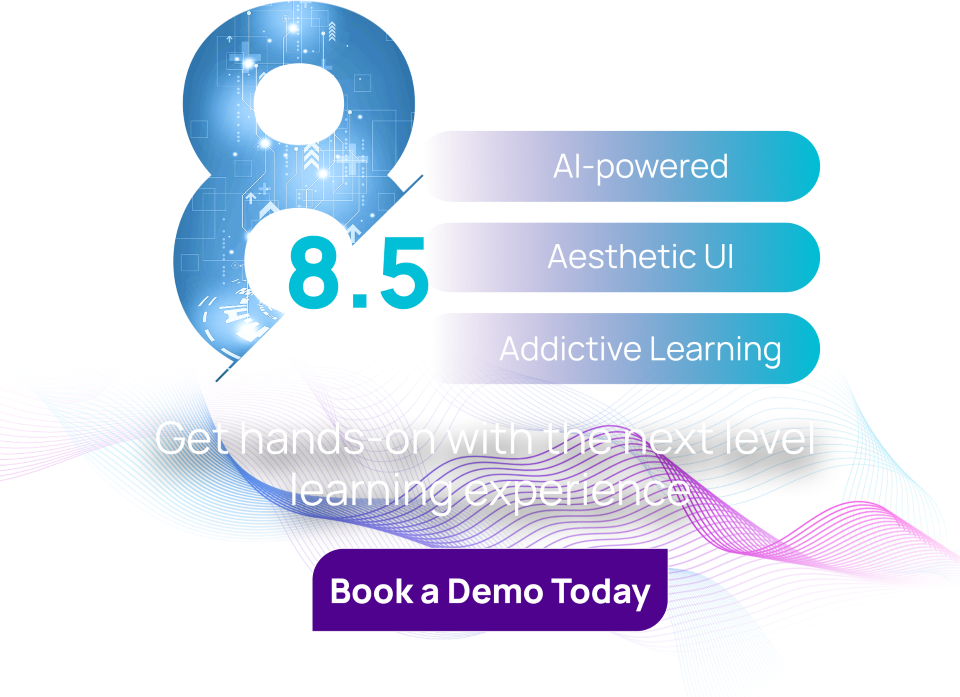
Maruti Suzuki Boosts Learning Efficiency by 60% with Tenneo LMS
May 29, 2025
Hero MotoCorp Boosts Employee Productivity and Sales by 25% with Tenneo LMS
August 28, 2025RBML Boosts Course Completion Rate by 45% with Tenneo LMS

Client:
Reliance BP Mobility Limited (RBML)
Industry:
Energy and Mobility
Reliance BP Mobility Limited (RBML) aimed to revolutionize training for its dispersed frontline workforce. The challenge was to overcome poor digital learning adoption, over dependence of Instructor Led Training, and inadequate tracking mechanisms for learning at Mobility Stations. RBML required a Next Generation Digital Learning Platform to enhance training adoption and engagement. Tenneo provided a comprehensive LMS with user management, mobile learning, gamified engagement, skill gap analysis, reporting, and multi-lingual support. These solutions resulted in a more knowledgeable and cohesive workforce, increased learning adoption rates, improved administrative efficiency, and significant advancements in employee skills and performance.
About the Client
Reliance BP Mobility Limited (RBML), a pioneering joint venture between Reliance Industries Limited and British Petroleum, is poised to redefine the fuel, oil and gas landscape in India. With a vision encapsulated in the tagline "Fueled by vision, driven by innovation & powered by excellence," – RBML aims to transcend traditional fuel offerings by introducing advanced fuels, electric vehicle (EV) charging solutions, and low-carbon innovations. This initiative aligns with RBML’s ambition to achieve net-zero emissions and contribute to the decarbonization of its operations and ecosystem. As RBML ventures into the mobility sector, it aspires to be a trusted partner for fleet owners, private vehicle owners, truck drivers, and aviation business proprietors by setting new standards in fuel quality, retail experiences, and advanced mobility solutions.
Business Requirement
To successfully implement their growth vision, RBML identified several key business requirements for a next-generation digital learning platform that would create an employee-centric learning environment. They had specific LMS requirements when they approached Tenneo:
- Enhanced Reach to Front-Line Staff: Training front-line employees, such as petrol pump attendants, handymen, shift supervisor, traffic wardens etc., is essential to improving service quality. By equipping these employees with the necessary skills and knowledge, RBML can enhance customer satisfaction and operational efficiency, ultimately driving revenue growth.
- Mobile-First Approach: A mobile-friendly LMS accessible on Android and iOS devices is crucial for a geographically dispersed workforce. This flexibility allows employees to engage in learning at their convenience, significantly improving training adoption rates and reducing the time to competency.
- Virtual Training Capabilities: Integration with platforms like Zoom and MS Teams enables remote training sessions, facilitating continuous learning without geographical constraints. This capability ensures that all employees, regardless of location, have access to the same high-quality training resources.
- KPI-based Learning Management: The ability to trigger targeted learning based on KPI scores aligns training initiatives with business objectives. This ensures that employees receive the training they need to improve performance, thus directly impacting productivity and operational success.
- Gamification for Engagement: By implementing a gamification module, RBML can motivate employees through friendly competition. This approach not only makes learning enjoyable but also drives higher participation rates, resulting in a more skilled and knowledgeable workforce.
- Multilingual Support: Supporting multiple languages is essential for accommodating India's linguistic diversity. By offering training content in regional languages, RBML ensures that all employees can fully engage with the training materials, enhancing understanding and retention.
These business requirements reflect RBML's commitment to developing a skilled workforce capable of driving operational excellence and achieving strategic goals in a competitive industry.
Key Challenges
RBML faced several significant challenges that hindered its ability to implement effective training initiatives and achieve seamless growth:
- Unsustainable Traditional Learning System: The reliance on traditional learning methods posed significant sustainability issues. The traditional learning systems lacked the scalability and adaptability needed to keep up with the dynamic training requirements of a rapidly growing workforce. This led to inefficiencies in skill development.
- Risk of Learning and Assessment Data Loss: The absence of a robust digital learning platform increased the risk of underutilizing learning capabilities and potential loss of critical assessment data. Without proper tracking and secure data management, employee progress and skill evaluations were not comprehensive. This hindered the ability to make informed decisions about workforce learning and development.
- Time-Consuming Physical Trainings: The predominance of physical training sessions before implementing a digital learning platform not only consumed excessive time but also limited the flexibility of learning opportunities. This traditional approach made it challenging for employees to balance training with their work schedules, resulting in lower participation rates.
- Challenges in Scheduling Training Sessions: Coordinating and scheduling training sessions across various locations proved to be a logistical challenge. The lack of an integrated system for managing these sessions led to inefficiencies, with many employees missing out on essential training due to scheduling conflicts or lack of timely communication.
- Difficulty in Training Dispersed Frontline Staff: Covering a geographically dispersed frontline workforce was a cumbersome task for trainers with the traditional learning system. The complexities of effectively engaging employees in different regions created inconsistencies in training delivery, leading to uneven training delivery and standardization.
Tenneo’s Approach & Solutions
To address these challenges and fulfill RBML's business requirements, Tenneo proposed a tailored LMS solution that encompasses several effective modules. The LMS has been activated with a range of modules and functionalities for 10,000 users, allowing them ample time to learn, process, analyze, and act. This will help in identifying the improvement areas and close the loop of learning development more comprehensively.
This vision also aligns with the organization's learning mission of "Learn, Reflect & Use." The next plan of action is to expand the solution and roll out to 25,000 users. The learning solution focuses on enhancing the digital learning environment with advanced reporting and dashboards, making the learning system more efficient and time-saving for the organization.
- User Management Module: Tenneo LMS enables administrators to efficiently manage users, roles, and access privileges, allowing for streamlined onboarding and training processes. Customizable user interfaces and organizational hierarchies enhance the user experience, making it easier for employees to navigate the platform. This structured approach ensures that employees receive targeted training relevant to their roles, improving engagement and learning outcomes. This simplified the scheduling process and ensured that each employee received training as per their role without compromising schedules and timelines.
- Mobile App for Learners & Trainers: The mobile-first LMS provides employees with access to learning programs and resources anytime, anywhere. The ability to launch virtual classrooms and track progress on mobile devices enhances accessibility and fosters a culture of continuous learning. By accommodating the unique needs of a geographically dispersed workforce, RBML ensures that all employees can engage with training, thus accelerating skill development and competency.
- Competency & Skill Gap Analysis Module: This feature allows administrators to create a comprehensive skills bank and identify skill gaps within the organization. By mapping competencies to job profiles and recommending targeted training, RBML can effectively enhance employee capabilities and ensure alignment with strategic business objectives. This data-driven approach not only addresses immediate skill gaps but also supports long-term workforce development.
- Gamified Learning Module: By introducing gamification elements, such as points, badges, and leaderboards, the LMS incentivizes learners to actively engage with training content. This interactive approach makes learning enjoyable and encourages healthy competition among employees, leading to higher participation rates and improved retention of knowledge.
- E-Learning Module: With a robust content library that supports multiple formats, the LMS enables RBML to standardize training across all locations. It also became easier to store and access learning and assessment data. This consistency ensures that every employee receives high-quality, relevant training tailored to their job roles, enhancing overall workforce competency. Tenneo LMS catered to over 9000 learners by effectively delivering 500+ learning courses and 62+ learning programs.
- Multilingual Capabilities: By offering content in 12 regional languages, Tenneo's LMS enhances accessibility for all employees, ensuring that language barriers do not impede learning and development. This inclusivity fosters a more engaged workforce, enabling RBML to maximize the effectiveness of its training initiatives.
Content was made accessible in the following languages:
English II. Hindi III. Punjabi IV. Bangla V. Oria VI. Assamese VII. Maithili VIII. Gujarati IX. Marathi X. Kannada XI. Malayalam XII. Tamil XIII. Telugu
Through these comprehensive solutions, Tenneo equips Reliance BP with the tools necessary to overcome existing challenges, boost employee engagement, and drive organizational growth in the competitive oil and gas industry.
Impact
The implementation of Tenneo LMS has significantly transformed the learning landscape for Reliance BP, leading to measurable improvements in employee training adoption, engagement, and overall business performance. The following impact metrics demonstrate the effectiveness of the solutions provided:
- Increased Training Adoption Rate: The adoption of the LMS among frontline staff saw a remarkable increase, with over 20 within the first three months. This surge in engagement indicates that the mobile-first approach and user-friendly interface successfully resonated with the workforce, enabling a culture of continuous learning.
- Enhanced Learning Engagement: Gamification elements implemented in the Employees participated in point-based competitions and leaderboards, leading to a more vibrant learning atmosphere. This higher level of engagement translates to better retention of knowledge and improved job performance across the board.
- Improved Skill Gap Analysis: The Competency & Skill Gap Analysis Module facilitated the identification of skills and competencies required for various job profiles, allowing for targeted training initiatives. As a result, employees reported feeling more confident in their roles, effectively bridging skill gaps and enhancing job performance.
- Localized Training Content: The multi-lingual capabilities of the LMS ensured that training materials were accessible to employees across India in 12 different languages. This boosted employee satisfaction regarding content relevance and understanding. This inclusivity not only motivated employees but also contributed to a more cohesive and knowledgeable workforce.
- Higher Completion Rates: a significant improvement compared to the previous training approach. This high level of completion is indicative of the LMS's effectiveness in delivering comprehensive and engaging content that resonates with employees.
- Reduced Training Administration Time: The User Management Module streamlined administrative tasks, reducing the time spent on managing users and training programs by 40%. This efficiency allowed HR teams to focus on strategic initiatives, further driving the organization’s learning and development objectives.

